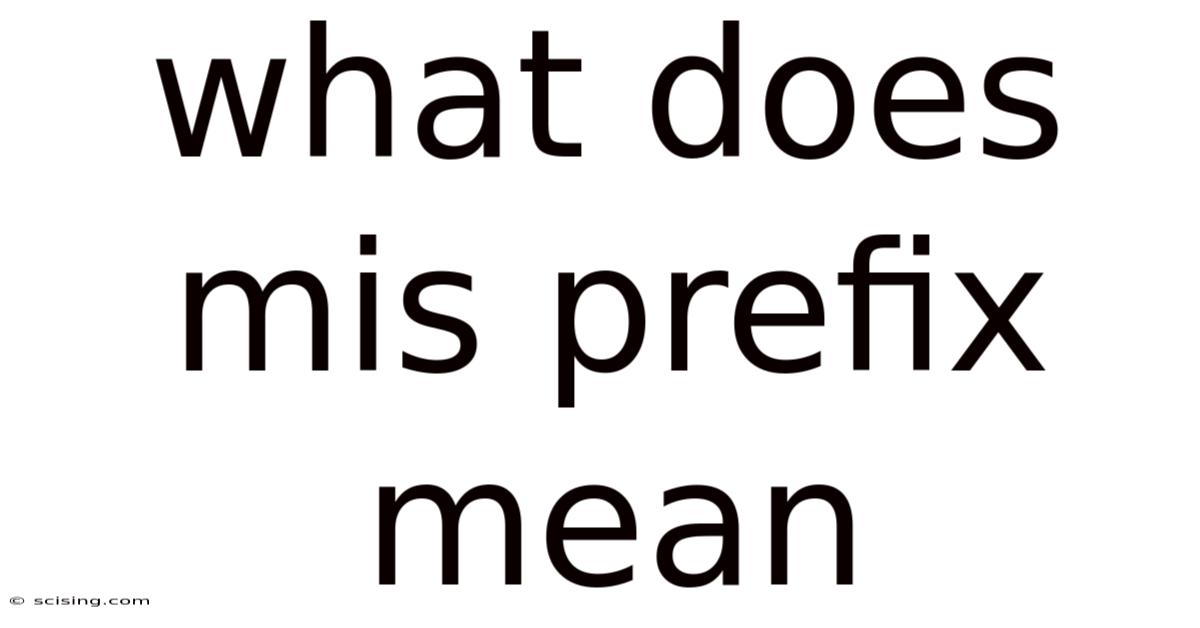What Does Mis Prefix Mean
scising
Sep 07, 2025 · 4 min read

Table of Contents
Decoding the Mystery: What Does the "Mis-" Prefix Mean?
The humble prefix "mis-" holds a surprising amount of power within the English language. It silently transforms words, subtly shifting their meaning from something positive or neutral to something negative or incorrect. Understanding its function is key to comprehending a vast range of words and improving your vocabulary. This article will delve deep into the meaning of "mis-", exploring its etymology, its usage in various contexts, and providing numerous examples to solidify your understanding. We'll also address common questions and misconceptions surrounding this versatile prefix.
Understanding the Etymology of "Mis-"
The prefix "mis-" originates from Old English, tracing its roots back to the Germanic languages. It's a direct descendant of the Old English prefix "mis-," itself derived from Proto-Germanic "*mis-," meaning "wrong," "bad," "ill," or "wrongly." This ancient heritage explains its enduring presence and consistent negative connotation in modern English. It's important to note that while "mis-" primarily conveys a sense of error or wrongdoing, its precise meaning can subtly shift depending on the word it modifies.
How "Mis-" Modifies Word Meaning: A Comprehensive Guide
The primary function of "mis-" is to indicate a deviation from the norm, a failure, or an incorrect action. It essentially adds a negative or corrective element to the base word. This can manifest in several ways:
-
Incorrect Action or Behavior: This is perhaps the most common usage. "Misunderstand," for example, signifies a failure to grasp the correct meaning of something. Similarly, "misbehave" implies acting improperly or disobediently.
-
Bad or Faulty Result: The prefix can also highlight a negative outcome. "Miscalculate" suggests an error in calculation leading to an inaccurate result. "Misjudge" implies forming an incorrect opinion or assessment of something or someone.
-
Misapplication or Misuse: "Misuse" itself perfectly illustrates this aspect. It implies using something inappropriately or for the wrong purpose. Other examples include "misapply" (using something incorrectly) and "misplace" (putting something in the wrong place).
-
Lack of Success or Failure to Achieve a Goal: Consider words like "misfire" (a failure to ignite or function correctly) or "miscarry" (a failure to achieve a desired outcome, often used in the context of pregnancy).
Exploring Examples Across Different Word Categories
To better illustrate the versatility of "mis-", let's examine its usage with various word types:
Verbs:
- Misinterpret: To understand something incorrectly.
- Mismanage: To manage something badly or inefficiently.
- Misinform: To give someone incorrect information.
- Mislead: To guide someone wrongly or deceive them.
- Misspend: To spend money unwisely or wastefully.
- Misteach: To teach something incorrectly.
- Misspeak: To say something unintentionally wrong.
- Misremember: To remember something incorrectly.
- Misplace: To put something in the wrong place, often temporarily losing it.
- Mistreat: To treat someone badly or cruelly.
Nouns:
- Misconception: A mistaken belief or understanding.
- Miscalculation: An error in calculation.
- Misjudgment: An incorrect assessment or opinion.
- Mishap: An unfortunate accident or mishap.
- Misunderstanding: A failure to understand something correctly.
- Misfortune: Bad luck or an unlucky event.
Adjectives:
While less frequent, "mis-" can also modify adjectives, though often indirectly. Consider "mismatched socks"—the socks themselves aren't inherently "mismatched," but their pairing is incorrect.
The Subtleties of "Mis-" and its Nuances
While generally indicating negativity, the prefix "mis-" doesn't always imply malice or deliberate wrongdoing. Sometimes, it simply denotes an unintentional error or a lack of success. For example, "misplacing your keys" isn't a malicious act; it's a simple mistake. The context is crucial in determining the severity of the implied negativity.
Frequently Asked Questions (FAQ)
Q: Is there a difference between "mis-" and "mal-"?
A: While both prefixes indicate negativity, they have distinct connotations. "Mis-" signifies error or incorrectness, while "mal-" implies ill will, badness, or wrongdoing. Compare "misunderstand" (an honest mistake) with "malicious" (deliberately harmful).
Q: Can "mis-" be used with all words?
A: No. The prefix "mis-" works best with words where a negative connotation of error or incorrectness makes semantic sense. It wouldn't be grammatically correct or logically sound to attach it to every word.
Q: Are there any exceptions to the negative connotation of "mis-"?
A: While rare, there might be contextual exceptions. The meaning of a word can be highly dependent on its context. However, the generally accepted and overwhelmingly common usage of "mis-" is to denote negativity, error, or failure.
Conclusion: Mastering the Versatile "Mis-" Prefix
The prefix "mis-" is a powerful tool in the English language, enriching vocabulary and subtly altering the meaning of words. By understanding its etymology, its varied applications, and its nuances, you can decipher the meaning of countless words and improve your overall comprehension and expression. This deep dive into the world of "mis-" should provide you with the knowledge to confidently navigate its usage and effectively communicate in a richer, more precise way. Remember to always consider the context when interpreting words prefixed with "mis-" to fully grasp their intended meaning. Its seemingly simple structure belies its versatility and importance in the ever-evolving landscape of the English language. Continuing to explore prefixes and their impact on word meaning will deepen your understanding of etymology and the beauty of language itself.
Latest Posts
Latest Posts
-
Quotes From Red Riding Hood
Sep 07, 2025
-
Ave Maria Lyrics English Translation
Sep 07, 2025
-
Is A Hawk An Herbivore
Sep 07, 2025
-
Dependency Theory Is Defined As
Sep 07, 2025
-
Drawing Of A Native American
Sep 07, 2025
Related Post
Thank you for visiting our website which covers about What Does Mis Prefix Mean . We hope the information provided has been useful to you. Feel free to contact us if you have any questions or need further assistance. See you next time and don't miss to bookmark.